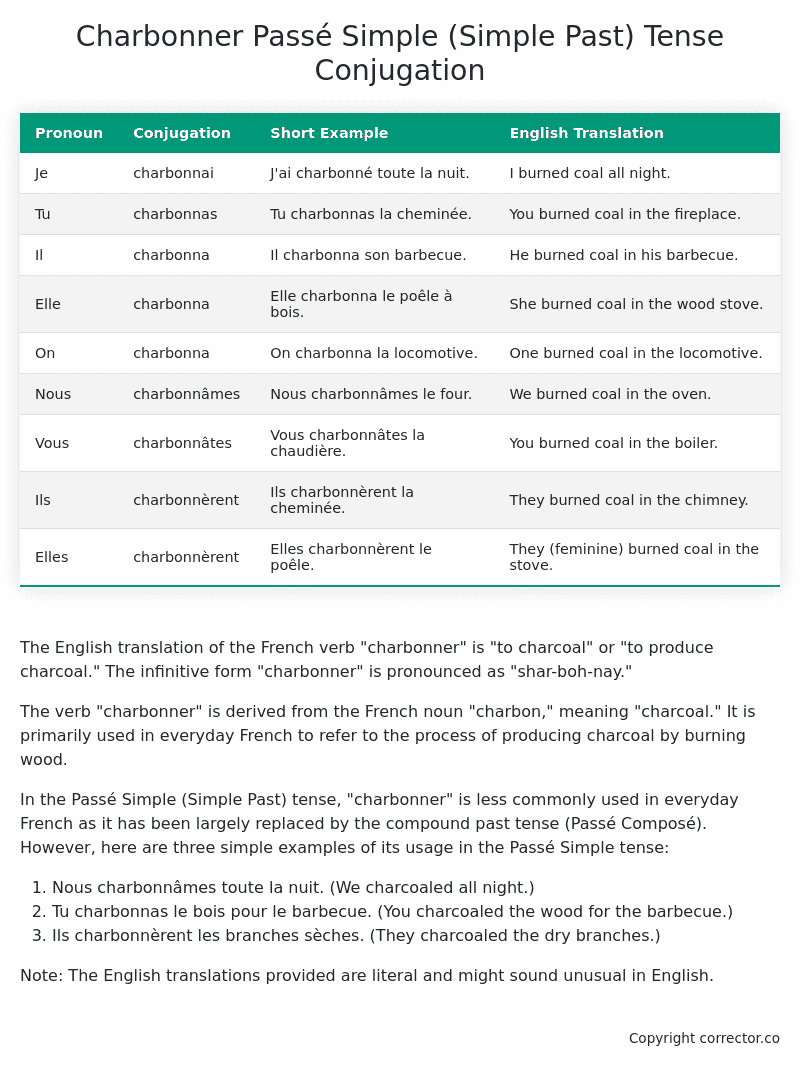Passé Simple (Simple Past) Tense Conjugation of the French Verb charbonner
Introduction to the verb charbonner
The English translation of the French verb “charbonner” is “to charcoal” or “to produce charcoal.” The infinitive form “charbonner” is pronounced as “shar-boh-nay.”
The verb “charbonner” is derived from the French noun “charbon,” meaning “charcoal.” It is primarily used in everyday French to refer to the process of producing charcoal by burning wood.
In the Passé Simple (Simple Past) tense, “charbonner” is less commonly used in everyday French as it has been largely replaced by the compound past tense (Passé Composé). However, here are three simple examples of its usage in the Passé Simple tense:
- Nous charbonnâmes toute la nuit.
(We charcoaled all night.) - Tu charbonnas le bois pour le barbecue.
(You charcoaled the wood for the barbecue.) - Ils charbonnèrent les branches sèches.
(They charcoaled the dry branches.)
Note: The English translations provided are literal and might sound unusual in English.
Table of the Passé Simple (Simple Past) Tense Conjugation of charbonner
| Pronoun | Conjugation | Short Example | English Translation |
|---|---|---|---|
| Je | charbonnai | J’ai charbonné toute la nuit. | I burned coal all night. |
| Tu | charbonnas | Tu charbonnas la cheminée. | You burned coal in the fireplace. |
| Il | charbonna | Il charbonna son barbecue. | He burned coal in his barbecue. |
| Elle | charbonna | Elle charbonna le poêle à bois. | She burned coal in the wood stove. |
| On | charbonna | On charbonna la locomotive. | One burned coal in the locomotive. |
| Nous | charbonnâmes | Nous charbonnâmes le four. | We burned coal in the oven. |
| Vous | charbonnâtes | Vous charbonnâtes la chaudière. | You burned coal in the boiler. |
| Ils | charbonnèrent | Ils charbonnèrent la cheminée. | They burned coal in the chimney. |
| Elles | charbonnèrent | Elles charbonnèrent le poêle. | They (feminine) burned coal in the stove. |
Other Conjugations for Charbonner.
Le Present (Present Tense) Conjugation of the French Verb charbonner
Imparfait (Imperfect) Tense Conjugation of the French Verb charbonner
Passé Simple (Simple Past) Tense Conjugation of the French Verb charbonner (You’re reading it right now!)
Passé Composé (Present Perfect) Tense Conjugation of the French Verb charbonner
Futur Simple (Simple Future) Tense Conjugation of the French Verb charbonner
Futur Proche (Near Future) Tense Conjugation of the French Verb charbonner
Plus-que-parfait (Pluperfect) Tense Conjugation of the French Verb charbonner
Passé Antérieur (Past Anterior) Tense Conjugation of the French Verb charbonner
Futur Antérieur (Future Anterior) Tense Conjugation of the French Verb charbonner
Subjonctif Présent (Subjunctive Present) Tense Conjugation of the French Verb charbonner
Subjonctif Passé (Subjunctive Past) Tense Conjugation of the French Verb charbonner
Subjonctif Imparfait (Subjunctive Imperfect) Tense Conjugation of the French Verb charbonner
Subjonctif Plus-que-parfait (Subjunctive Pluperfect) Tense Conjugation of the French Verb charbonner
Conditionnel Présent (Conditional Present) Tense Conjugation of the French Verb charbonner
Conditionnel Passé (Conditional Past) Tense Conjugation of the French Verb charbonner
Conditionnel Passé II (Conditional Past II) Tense Conjugation of the French Verb charbonner
L’impératif Présent (Imperative Present) Tense Conjugation of the French Verb charbonner
L’impératif Passé (Imperative Past) Tense Conjugation of the French Verb charbonner
L’infinitif Présent (Infinitive Present) Tense Conjugation of the French Verb charbonner
L’infinitif Passé (Infinitive Past) Tense Conjugation of the French Verb charbonner
Le Participe Présent (Present Participle) Tense Conjugation of the French Verb charbonner
Le Participe Passé (Past Participle) Tense Conjugation of the French Verb charbonner
Struggling with French verbs or the language in general? Why not use our free French Grammar Checker – no registration required!
Get a FREE Download Study Sheet of this Conjugation 🔥
Simply right click the image below, click “save image” and get your free reference for the charbonner Passé Simple tense conjugation!

Charbonner – About the French Passé Simple (Simple Past) Tense
Formation
Usage
Narration
Historical Context
Interactions with other tenses
Passé Composé
Imparfait
Conditional and Subjunctive
Summary
I hope you enjoyed this article on the verb charbonner. Still in a learning mood? Check out another TOTALLY random French verb conjugation!


